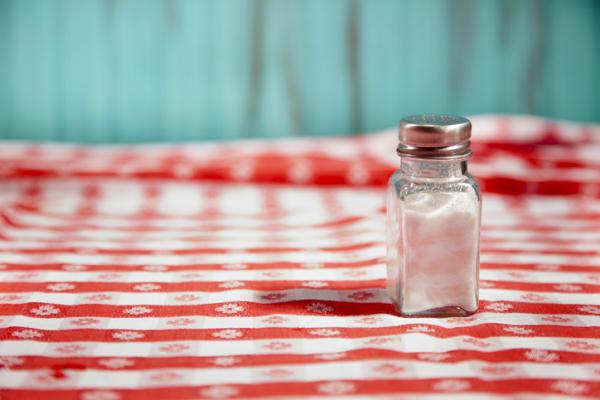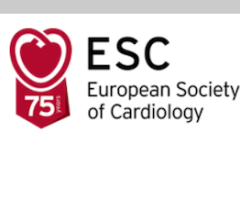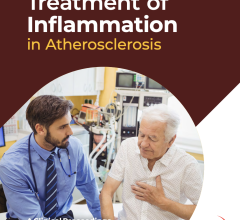
Results of a randomized trial presented at the American Heart Association’s Scientific Sessions 2023, AHA 2023, in in Philadelphia, PA, today, compared the effects of high-sodium and low-sodium diets on blood pressure in adults. Researchers found that following a low-sodium diet significantly lowered blood pressure in 70%-75% of participants in as little as one week, including people currently taking blood pressure medications. The findings were simultaneously published in The Journal of the American Medical Association, JAMA. Image courtesy: Getty Images
November 11, 2023 — Results of a randomized trial presented today at the American Heart Association’s Scientific Sessions 2023 (AHA 2023), which compared the effects of high-sodium and low-sodium diets on blood pressure in adults, found that following a low-sodium diet significantly lowered blood pressure in 70%-75% of participants in as little as one week, including people currently taking blood pressure medications.
In the study, “Effect of Dietary Sodium on Blood Pressure: A Crossover Trial,” systolic blood pressure was significantly lowered by 7-8 mm Hg for participants following a low-sodium diet in comparison to those following a high-sodium diet, and by 6 mm Hg for the low-sodium group compared with their usual diet. The full manuscript is also simultaneously published in The Journal of the American Medical Association, JAMA, according to a detailed overview of the trial, shared below, which was released after the late-breaking session by the American Heart Association, whose AHA 2023 Scientific Sessions are taking place Nov. 11-13 in Philadelphia, PA.
“High blood pressure is the most common chronic disease condition in the world, and for the majority of adults, dietary sodium intake influences blood pressure,” said Deepak K. Gupta, M.D., M.S.C.I., FAHA, associate professor of medicine and director of the Vanderbilt Translational and Clinical Cardiovascular Research Center in the division of cardiovascular medicine at Vanderbilt University Medical Center, in Nashville, Tennessee. “However, dietary sodium recommendations are debated in part due to the variability in blood pressure response to sodium consumption from food.”
Researchers measured participants’ blood pressure while on their usual diets, then conducted a randomized trial in these same participants to understand how variation in dietary sodium between higher- and lower-sodium intake may relate to changes in blood pressure.
The study included more than 200 adults, ages 50-75 years, from the Coronary Artery Risk Development in Young Adults (CARDIA) study as well as other individuals. Participants were randomized to either a high-sodium diet with 2,200 mg of sodium added to their usual daily diet, or a low-sodium diet with a total of 500 mg sodium daily for one week. Participants then switched to the opposite diet for one week. Participants’ blood pressure was measured over a 24-hour period on the last day of each diet.
The results found that one week of the low-sodium diet significantly lowered systolic blood pressure in nearly 75% of adults. Additional results:
- The median systolic blood pressure measurements were 125-, 126- and 119-mm Hg for the usual, high- and low-sodium diets, respectively.
- Systolic blood pressure was significantly lowered by 7-8 mm Hg for participants while following the low-sodium diet compared with participants in the high-sodium group and by 6 mm Hg compared with participants following their usual diet. These reductions in systolic blood pressure are comparable to the reductions attained with a common, first-line medication for hypertension.
- The usual diet for most individuals was already very high in sodium at approximately 4,500 mg/day. Participants’ systolic blood pressure was not significantly greater with the high-sodium diet compared with usual diet.
- In contrast, returning to a high-sodium diet did raise blood pressure when starting from the low-sodium reference point.
“These results indicate that lowering blood pressure through dietary sodium reduction can be achieved safely and rapidly within one week,” Gupta said. “Our study also supports the American Heart Association’s position that consuming excess sodium beyond recommended levels is associated with increasing blood pressure.” Additionally, the effect of reduction in dietary sodium on blood pressure was consistent across individuals with normal blood pressure, treated high blood pressure, and untreated high blood pressure. Gupta also noted, “This reinforces the importance of reductions in dietary sodium intake to help control blood pressure, even among individuals already taking medications for hypertension,” Gupta said. “Just as any physical activity is better than none for most people, any sodium reduction from the current usual diet is likely better than none.”
Trial background and details
In contrast to several of the largest prior studies examining the effect of dietary sodium on blood pressure, the trial included individuals taking medications for high-blood pressure as well as people with diabetes (Type 1 or Type 2 not collected), the researchers noted.
At the start of the study, about one-quarter of the 213 participants had normal blood pressure, 20% had controlled high blood pressure, 31% had uncontrolled high blood pressure and the remaining 25% had untreated high blood pressure. Approximately 1 in 5 participants had diabetes.
73% of participants were from the CARDIA study. Other participants were adults in Birmingham, Alabama, and Chicago, Illinois. Participants were ages 50 to 75 years, 65% were women, and 64% were Black adults.
The low-salt diet included food and drinks provided by the researchers and daily meal plans. Sample breakfasts included oatmeal, Greek yogurt and grapes; sample lunches included fruit, a bag of chips and either a chicken salad, lentil soup or peanut butter and jelly sandwich; and sample dinners included fruit, a bottle of 1% low-fat milk and either a low-sodium frozen burrito, low-sodium frozen vegetable lasagna or a low-sodium rice and vegetable entree.
Participants on the high-sodium diet added 2,200 mg of sodium to their regular daily diet — by consuming two chicken bouillon packets daily, with 1,100 mg of sodium each, as provided by the researchers.
The median estimated total daily sodium intake for people on the high-sodium diet was 5,000 mg/day.
People on the low-sodium diet had a median, 24-hour urine sodium level of approximately 1,300 mg, suggesting that some individuals consumed sodium outside of the food and drink provided.
The United States Department of Agriculture’s Dietary Guidelines for Americans 2020-2025 recommends adults should consume less than 2,300 mg of sodium daily, however, it’s estimated that adults in the U.S. typically consume about 50% more sodium, or about 3,400 mg/day. The American Heart Association recommends no more than 2,300 mg of sodium/day and moving toward an ideal limit of no more than 1,500 mg/day for most adults.
According to Gupta, all the items on the low-sodium diet menu were commercially available in grocery stores and online retailers, therefore, it is possible for people to achieve a similar diet low in sodium without participating in a clinical trial.
The investigators noted limitations of their study. Researchers did not observe patients eating the foods on each prescribed menu, in an effort to reflect “real-life” conditions, therefore, there may have been variability in sodium intake; and the dietary interventions were of one-week duration, meaning the study design did not address the long-term sustainability of the low-sodium diet or its effect on blood pressure. In addition, the results may not be generalizable to populations with different demographics than the study group, Gupta noted.
Co-authors with Gupta include: Cora E. Lewis, MD, MSPH; Krista A. Varady, PhD; Yan Ru Su, MD; Meena S. Madhur, MD, PhD; Daniel T. Lackland, DrPH; Jared P. Reis, PhD; Thomas J. Wang, MD; Donald M. Lloyd-Jones, MD; Norrina B. Allen, PhD.; disclosures and funding sources are listed in the abstract, noted the AHA News summary.
More information: www.heart.org
Follow more of DAIC’s AHA 2023 news coverage here.


 February 04, 2026
February 04, 2026 









